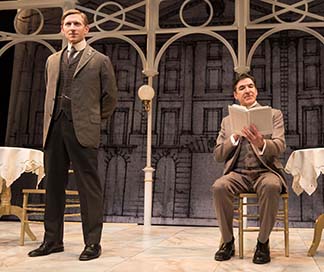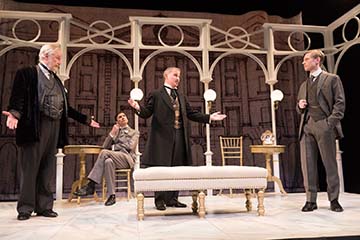By Lucy Komisar
George Bernard Shaw‘s first play, given a first rate performance by The Actors Company Theatre directed by David Staller, establishes the theme of personal morality vs business corruption that would be a signature of his works through the years. He wrote it in 1892.

Shaw from the start liked to skewer snobbery. Harry Trench (a na¯ve but likable Jeremy Beck) and Billy, more formally William De Burgh Cokane, (the unctuous Jonathan Hadley) are British tourists at a hotel on the Rhine. Pretentious Billy flavors his speech with French, and we enjoy the fact that his accent and grammar are dreadful.
They meet an even less cultured fellow traveler, Mr. Sartoius (a properly crude Terry Layman) who thinks a church called Appollinaris is named after the water. His daughter Blanche (Talene Monahon, very good as the young hysterical ingénue) would rather visit shops than churches. All but Harry are obnoxious.
Harry and Blanche meet and in minutes (it seems), she has inveigled him into an engagement. Seems too fast to be believable.

Shaw didn‘t have time for much courtship in this play, because he needed to devote most of the action to Harry‘s discovery of the dark side of his intended family.
Sartoius says he has real estate and is connected to Dr. Trench and his aristocratic relative. Hmm.
It all becomes clear in Sartoius‘ drawing room when the frightened, groveling employee Lickcheese (John Plumpis) – note the Dickensian name – complains that he has problems because the wood stairs in one of the tenements is dangerous, three women have been injured there, the stairs should be stones. And he is getting all the rent he can: “No man alive could have screwed more out of those devils.” Because he fixed the staircase, he is fired.
His plea for intervention by Harry and Billy meets deaf ears. Billy remarks about Sartoius, “His affection for his daughter is a redeeming point, certainly.” Shaw turns that ironically on his head, when Lickcheese declares, “She’s a lucky daughter, sir. Many another daughter has been turned out upon the streets to gratify his affection for her. That‘s what business is, sir.”

And who is the moral guy here, “Which of us is the worse, I should like to know? Me that wrings the money out to keep a home over my children, or you that spends it and try to shove the blame on to me?
So the first issue is how the young doctor Harry Trench will deal with the fact that the lady‘s father is a slumlord. And that she doesn‘t seem to mind.
Harry confronts Sartoius: “I found out this morning from your man, Lickcheese, that your fortune has been made out of a parcel of unfortunate creatures that have hardly enough to keep body and soul together”made by squeezing, and bullying, and threatening, and all sorts of tyranny.”
First Sartois needs to know: “I assume, to begin with, Dr. Trench, that you are not a Socialist, or anything of that sort.” Oh, no, he votes Conservative. “At least, if I ever took the trouble to vote, I should vote for the Conservative and against the other fellow.” Shaw, of course, was a Fabian socialist.
Then he explains that poor people don‘t know how to live in proper dwellings: they would wreck them in a week.

Lickcheese returns in top hat and tails, having transformed himself. Seems he got involved with a parliamentary report about housing for the working classes that focused on London‘s worst slumlords, and he has extorted money from people he would have exposed.
So what happens when a Conservative‘s good intentions come smack up against his pocketbook? Sartoius informs Harry that the annuity that supports him is based on interest from the mortgage on the slum.
And, by the way, if he sticks with it, there‘s a thoroughfare planned for the area, and if they upgrade the property, they can demand big compensation from the government.
Does this play written more than a hundred years ago seem very current? Director Staller makes it seem as if it could happen today. Are there slumlords that game the system? Are there good guys who don‘t have a problem enjoying the profits thereby derived? From fraudulent mortgages, for example, when they are bundled into whatever? Hmm.
So, will the moral Conservative ditch the immoral investment? Will he marry the slumlord‘s daughter? Will England in the late 1800s change? The Labor Party would be founded in 1900, eight years after Shaw wrote “Widowers‘ Houses.” The play is an excellent prequel to why that happened. The party had a good run until Tony Blair. Then, as Billy might have said, “Plus Òa change, plus c‘est la mªme chose.”*
“Widowers‘ Houses.” Written by George Bernard Shaw, directed by David Staller. The Actors Company Theatre/TACT at Samuel Beckett Theatre, 410 W. 42nd St. New York City. 212-714-2442. Opened March 13, 2016, closes April 2, 2016. 3/25/16. (*The more things change, the more they stay the same.)

